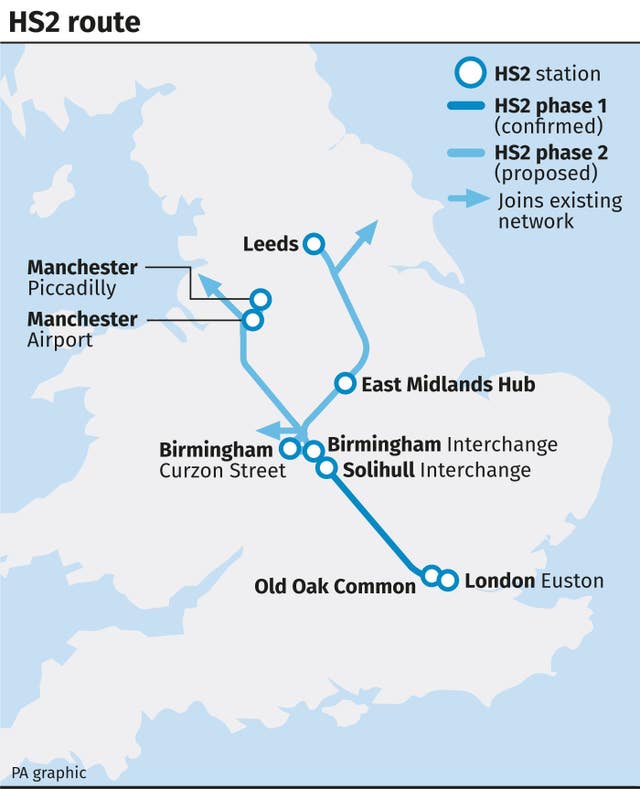
HS2 should be scrapped in favour of upgrading existing rail routes and building new rail links between mainlines, according to a free market think tank.
A report by the Adam Smith Institute argues that alternatives to the high speed railway can deliver increased capacity and reduced journey times for less money.
It warns that HS2 risks being a “massive black hole” for taxpayers.
A plan set out by the think tank includes upgrading existing routes through measures such as doubling tracks, re-opening closed lines and redesigning timetables.
It called for new sections of “conventional high speed” lines to be built between the mainlines and Manchester, Leeds and Birmingham, and updating train facilities including wi-fi, seating and charging points.
A review into whether to scrap HS2 was launched by Prime Minister Boris Johnson in August and is due to be completed this autumn.
This is being led by Douglas Oakervee, a former chairman of HS2 Ltd – the taxpayer-funded firm building the railway – with Lord Berkeley acting as his deputy.
Recent figures compiled by HS2 Ltd show the railway could be delayed by up to seven years and run £26 billion over budget, reaching a cost of £88 billion.

Rail consultant Adrian Quine , who wrote the report for the Adam Smith Institute, said: “HS2 has become the most out of control project of our generation. There is no disputing that the UK needs new rail infrastructure but HS2 does not deliver what it claims.
“It is ideologically driven, over engineered and will not solve the problems facing rail travellers today.
“Britain does need new lines in places and does need investment in rail to support the economy and social mobility. So much can be achieved with our existing network rather than applying an HS2 sledgehammer to crack a nut.”
Adam Smith Institute head of research Matthew Lesh said: “HS2 is a massive white elephant – but it’s not too late to abandon this project that’s over budget and missing deadlines before it causes any more national embarrassment.
“It is broadly accepted that we need to increase capacity on the intercity rail lines, but this can be done without a £106 billion price tag for the taxpayer.
“We can upgrade bottlenecks in existing lines, build new lines into major cities like Manchester, Birmingham, and Leeds, and reopen unused lines.
“It’s time to say goodbye to the failed HS2 model and think of innovative, cost-effective solutions to deliver the railway network of the future.”
Speaking for the Connecting Britain campaign, Cllr Judith Blake, Leader of Leeds City Council and West Yorkshire Combined Authority Transport Lead, said: “It is nonsense to suggest that some relatively modest interventions on the existing rail network would provide anything close to the capacity and journey times offered by HS2, integrated with Northern Powerhouse Rail. In my own region, this investment will deliver 50,000 additional jobs as well as an annual £600m boost to the UK economy from better connections between Leeds and Birmingham.”
A spokesperson for the Department for Transport said: “The Secretary of State has established an independent review into HS2, led by Douglas Oakervee with Lord Berkeley as deputy and a panel of advisers. This will provide the department with clear advice on how and whether the project should proceed.”
“We are not going to pre-empt or prejudice this work with a running commentary on the review’s progress.”
Phase 1 of HS2 is planned to run between London and Birmingham.
A second Y-shaped phase will launch in two stages: Phase 2a from the West Midlands to Crewe followed by phase 2b from Crewe to Manchester, and Birmingham to Leeds.


Why are you making commenting on The National only available to subscribers?
We know there are thousands of National readers who want to debate, argue and go back and forth in the comments section of our stories. We’ve got the most informed readers in Scotland, asking each other the big questions about the future of our country.
Unfortunately, though, these important debates are being spoiled by a vocal minority of trolls who aren’t really interested in the issues, try to derail the conversations, register under fake names, and post vile abuse.
So that’s why we’ve decided to make the ability to comment only available to our paying subscribers. That way, all the trolls who post abuse on our website will have to pay if they want to join the debate – and risk a permanent ban from the account that they subscribe with.
The conversation will go back to what it should be about – people who care passionately about the issues, but disagree constructively on what we should do about them. Let’s get that debate started!
Callum Baird, Editor of The National
Comments: Our rules
We want our comments to be a lively and valuable part of our community - a place where readers can debate and engage with the most important local issues. The ability to comment on our stories is a privilege, not a right, however, and that privilege may be withdrawn if it is abused or misused.
Please report any comments that break our rules.
Read the rules here